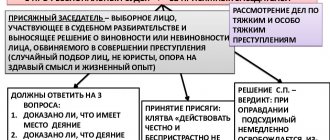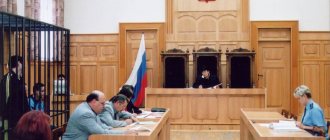Home / Court / Legal proceedings
Back
Published: 12/20/2021
Reading time: 13 min
0
251
With the introduction of the new federal law No. 113 (as amended and supplemented in 2020), the powers of the jury have expanded significantly. District and garrison executive authorities can bring assessors to court if the criminal case is carried out under certain articles of the Criminal Code of Russia. Most human rights activists believe that the 2021 reform will increase the statistics of acquittals. The opinion is due to the fact that ordinary people who are not interested in the outcome are involved in justice. However, when filing an application, defendants need to know what cases are heard by a jury in Russia.
FREE CONSULTATION WITH A LAWYER
Tel.
+7 (800) 302-65-54 Free in Russia
What cases are considered with the participation of a jury.
- 1 Basic and special powers of jurors in court 1.1 Basic
- 1.2 Special powers
- 2.1 In criminal proceedings
What is a jury trial?
The Russian judicial system is far from perfect - experts talk about an accusatory bias in legal proceedings and an extremely small proportion of acquittals. There are still hundreds of entrepreneurs in pre-trial detention centers who, on a formal basis, were accused of organizing a criminal community, and among the judges they continue to find very strange personalities (like Elena Khakhaleva).
But, nevertheless, an ordinary person can still become, albeit for a short time, part of the judicial system - namely, become a juror.
Jury trial
- This is a panel of six (in district or city courts) or eight (in the Supreme Court of the region) people who consider some criminal cases and make decisions - whether the accused is guilty or innocent of a crime.
According to the current Criminal Procedure Code of the Russian Federation, at the request of the accused, a criminal case can be considered by a court composed of a professional judge and a jury.
The jurisdiction of the jury was gradually reduced, and to date they have only those cases in which life imprisonment or the death penalty (formally it has not been abolished) can be imposed - Art. 105
Criminal Code of the Russian Federation “Murder”, Art.
210
“Organization of a criminal community”, Art.
228
.
1
“Illegal production, sale or transfer of narcotic drugs,” etc.
Also, the accused may request a jury trial of cases under articles 126
“Kidnapping”,
209
“Banditry”,
354
“Public calls for unleashing an aggressive war” and some others.
The most important thing here is that trial by jury is possible only at the request of the accused
, otherwise the case will be considered by the usual composition. On the other hand, once you have chosen jury trial, you cannot refuse it.
The second key point is that the jury does not consider the entire case.
. Their purpose is to determine the degree of guilt of the defendant. They do not impose punishment (this is the prerogative of a professional judge), so they review the case faster than usual. As a rule, jurors question only those witnesses whose testimony is directly related to the guilt of the defendant.
The jury may return a verdict of guilty or not guilty:
- a guilty verdict is pronounced if the majority of the jury gave a positive answer to the question of the defendant’s guilt;
- A verdict of not guilty is returned if the question of guilt is answered in the negative by half or more of the jurors.
In other words, if 3 out of 6 jurors
consider the defendant innocent, the presiding judge is obliged to acquit him (and this is mandatory). If the verdict is guilty, the judge can still issue a not guilty verdict. For example, if it considers that the actions of the defendant do not contain signs of a crime.
In some cases, the presiding judge has the right to dismiss the jury
- if he believes that a guilty verdict has been passed against an innocent person. Then the case will be considered by a different court from the very beginning.
In Russian judicial practice, juries do not consider very many cases, but the percentage of acquittals, as lawyer Lyudmila Alexandrova from
, high enough. Perhaps, she says, it's because jurors don't always make decisions based on the evidence:
At the end of January 2021, the Institute for Law Enforcement Problems published an analytical review by Ekaterina Khodzhaeva, a research fellow at the Institute of Political Science at EUSP, on the work of jury trials based on statistical data from the Judicial Department at the Supreme Court of the Russian Federation.
Indeed, the percentage of acquittal verdicts rendered by jury trials ranges from 16 to 25%. But starting from the 2nd half of 2021 (after changes were made to the Code of Criminal Procedure of the Russian Federation in connection with the expansion of the use of the jury), every fifth acquittal decision made at the district court level was overturned on appeal, and in the first half of 2021 this figure increased to 37%.
Jurors are ordinary citizens, often without legal education. In my opinion, they form their opinion not only on the basis of the evidence presented and the behavior of the defense during the trial, but are also guided by their internal beliefs, their life experience and their moral principles. If the case being considered in which the jury is involved has a public outcry, they study information published in the media (despite the judge’s arguments to evaluate only the evidence presented at the trial).
Lyudmila Alexandrova, lawyer.
The problem may also be that it is easier for the defense to switch from “judicial” language to something more understandable for ordinary people - while prosecutors behave with jurors in the same way as with professional judges
.
Perhaps that is why the jurisdiction of the jury is gradually being reduced and their right is being “taken away”
try cases on certain charges.
College education
The formation of a jury in a criminal trial is a special sequence of actions in judicial practice, which is strictly regulated by the legislator.
In order to assemble the required number of jurors, it is necessary to prepare lists of candidates in advance.
In accordance with these lists, citizens are invited to the courtroom, where the presiding officer makes a short report on the following issues:
- getting to know the parties to the process;
- an explanation of the nature of the criminal proceedings;
- announcement of the approximate duration of the proceedings;
- clarification of the purpose of attendance at the jury meeting.
In addition, the judge will explain to candidates their right to recuse themselves and their responsibilities.
The next stage is the consideration of self-recusations, of which there are a large number. The judge is obliged to satisfy them, regardless of whether there are good reasons for doing so or not. No one is obliged to become a participant in the proceedings in court if he is in no way connected with the case.
The procedure then consists of a discussion of each candidate for jury position.
Let us note that Art. 328 (Code of Criminal Procedure of the Russian Federation) describes all the stages provided for this process:
- questions from the parties to candidates in order to find out the reasons that may serve to disqualify a candidacy;
- announcement of information about a specific candidate and discussion of it;
- statement of the parties to challenge for legal reasons;
- consideration by the judge of challenges of candidates from one side or the other, if they are motivated;
- consideration of unmotivated challenges if there are more candidates than necessary for the trial (the accused party is heard first);
- entering the list of jurors into the protocol.
If during the procedure a problem arises in the insufficient number of jurors, another meeting is scheduled, to which candidates from the additional list are invited. The procedure is repeated again.
After the list of twelve jurors has been announced and alternate jurors have been named, they are asked to take special seats. The entire process takes place in a meeting, which is held behind closed doors.
When a case involves a secret of state importance, each juror is required to sign a non-disclosure agreement. Refusal of such a subscription is a reason for disqualifying a juror and replacing him with an alternate.
In order to streamline the process of jury participation in a case, the legislator decreed the need to select the eldest among them. He is elected by the board members themselves by simple voting. It is through him that the jury will convey their questions and wishes to the judge.
History of jury trials in Russia
Legislation regarding jury trials is constantly changing, with the most recent major changes occurring in June 2018. And until this date, the rules were constantly changing.
Formally, the jury began working in 1991, but in fact it started working in November 1993
-th in some regions and in experimental mode. Back then, juries heard between 170 and 420 cases per year each year.
In fact, the full introduction of juries into the judicial system was delayed until 2003
years - then the possibility of considering cases by a panel of jurors appeared at the level of the Supreme Courts in most constituent entities of the Russian Federation. Only in the Chechen Republic did jury trials appear only in 2010 instead of 2006.
After 2003, the number of jury cases began to increase, there were already 500-700 cases every year
, and assessors decided the fate of 1000-1600 people annually. In the majority of cases, the verdicts were guilty - from 62 to 82% of cases, usually 16-17% of the defendants were acquitted.
Even this percentage of acquittal verdicts was above the national average, and even then the jury began to “close” some crimes, says Nikita Filippov from the De Jure Collegium:
With each year of the jury trial, the number of requests from the accused to have his case considered by this court increased. This trend was primarily due to statistics on the consideration of criminal cases with and without a jury trial. The number of acquittals rendered with the participation of a jury trial far exceeded the number of acquittals rendered by a court in a general manner.
The high number of acquittals in criminal cases considered by juries has caused a controversial reaction in society. Victims of crimes considered it unacceptable for justice to be administered by a jury that did not have the necessary knowledge, experience and qualifications; the competence of a jury raised doubts not only among citizens, but also among the authorities.
In this regard, in the period from 2009-2013, significant changes were made to the Criminal Procedure Code of the Russian Federation in terms of determining the competence of a jury trial; criminal cases of crimes of increased social importance (crimes against sexual inviolability, crimes against public safety, crimes against state power).
Nikita Filippov, head of the MGCA “Bureau of Lawyers “De Jure””, honorary lawyer of Russia.
In 2013-2014, the jurisdiction of jury courts is being reduced even further
- only those who were facing life imprisonment could apply for such a trial. Moreover, women, minors and men over 65 could not request a jury trial.
The number of cases tried by jury was cut in half (to about 250 per year). One of the reasons for the reduction in jury jurisdiction could be the high cost of such a process.
Nikita Filippov says:
The decline in cases tried by jury may have been driven by economic factors. The functioning of a jury trial requires significant financial costs. Courts reimburse jurors for travel expenses, as well as transportation expenses for travel to the location of the court and back, including cases when the panel was not formed; in addition, jurors are paid remuneration in the amount of half the salary of a judge of the relevant court in proportion to the number of days of their participation in the administration of justice, but not less than their average earnings at their main place of work for this period. According to the deputy chairman of the Volgograd Regional Court, Dmitry Petrovich Tulenkov, the cost of considering one case with the participation of jurors ranges from 160 to 360 thousand rubles (only jury fees and appearance costs)
However, the limitation of the competence of the jury immediately had a negative impact on the criminal justice system of the Russian Federation, the level of citizens' trust in the judicial system decreased, and the institution of the jury ceased to function normally. As a result, in 2015, the President of the Russian Federation initiated a reform of the institution of jury trials, aimed at increasing the role of this institution in the criminal justice system of Russia, the jurisdiction of the jury was expanded, and from June 1, 2021, district courts acquired the right to consider some criminal cases with the participation of jurors.
These changes have had a positive impact on the work of the jury; the number of cases tried with the participation of jurors has increased.
Nikita Filippov, head of the MGCA “Bureau of Lawyers “De Jure””, honorary lawyer of Russia.
The most important amendments to date began to take effect only on June 1, 2021, when it became possible to request a trial by jury at the level of city and district courts. By the way, this immediately increased the number of applications by about 3 times
– up to 330-340 annually. But, nevertheless, this is still lower than it was after 2003 (despite the fact that then jury trials were only at the level of the Supreme Court of the region).
Why does the state limit the powers of jury trials? The answers may vary, but, according to lawyer Nikolai Gerasimov, in cases where the state is interested, it is simply “impossible” to get an acquittal:
Between 2008 and 2015, changes were made that significantly reduced the number of cases that can be tried by jury. For example, cases of terrorism, organizing mass riots, high treason, espionage, violent seizure or retention of power, armed rebellion, sabotage, corruption, and crimes against sexual integrity were removed from its jurisdiction.
I believe this was primarily due to the desire of the state to protect itself from possible acquittals in cases of special importance, where such verdicts should not exist.
I am convinced that many citizens of the Russian Federation, who would constitute a jury, understand that, as it seems to me, in the conditions of the modern state system, criminal cases are not always initiated out of a desire to protect society and the state from criminal offenses and to bring to justice the person who committed the crime. crime. This circumstance would force them to especially carefully and in detail examine all the circumstances of the case, all the evidence presented by the prosecution and defense, which could lead to unforeseen results.
In addition, in my opinion, at present the quality of the preliminary investigation and the maintenance of the state prosecution in court leaves much to be desired, which could also play a definite role in the decision-making by the jurors.
Nikolay Gerasimov, lawyer in criminal and civil cases in the field of business activities.
Be that as it may, a year and a half after the amendments came into force, city and district courts gradually began to work with juries, and now the number of cases that are considered in this way is even slightly greater than the number of petitions filed
(that is, cases based on petitions from previous years are gradually being considered).
Organization of trial by jury
As stated above, consideration of a criminal case by a jury is the exclusive right of the defendant accused under certain articles of the Criminal Code of the Russian Federation. That is, the court cannot impose a compulsory jury trial - its motion is required.
Submit a petition
the defendant can from the moment he familiarizes himself with the case until the appointment of a court hearing, including at the preliminary hearing (and the investigator must report this).
If more than one person is accused in a case, the jury will consider their case as one. For this purpose, a petition from one of the accused is sufficient if the others support it. If someone is against it, the judge will have to separate his case into separate proceedings (if at all possible).
An important point - jury selection
, and it begins long before the start of the trial. In general, the process consists of several stages:
- the municipal administration randomly selects a number of candidates from the State Automated System “Elections” (that is, from the general database of those who have the right to vote);
- the list is edited and corrected, then it is transferred to the regional level, where a general list is compiled for all courts of the constituent entity of the Russian Federation. This list is published in the media.
If a citizen finds himself on the list, but for some reason reason he doesn't want to serve on a jury, he submits a corresponding application and is excluded from the list.
- the list of candidates (main and reserve) is sent to the court;
- After the motion, the judge orders a jury trial and orders the selection of a certain number of jurors. This is done by the secretary or assistant referee in a random order. Usually a little more people are selected than 6 or 8 - some part will still not show up.
Selecting suitable people to sit as jurors is not very easy, says Petr Gusyatnikov from the law firm PG Partners. Thus, serious requirements are imposed on them; persons cannot serve as jurors
:
- under 25 years old;
- having an outstanding or unexpunged criminal record;
- incapacitated or having limited legal capacity;
- registered in a drug treatment or psychoneurological dispensary;
- suspected or accused of a crime;
- those who do not know the language in which the case is being conducted;
- having other disadvantages that do not allow them to participate in the process.
Accordingly, jury selection is a very troublesome business.
:
In theory, finding a sufficient number of such citizens is not difficult, but in practice they still need to be checked, asked to provide certificates of no criminal record, from the PND, ND, etc. – this also takes time and resources.
Petr Gusyatnikov, senior managing partner of the law firm PG Partners.
When the selected jurors appear in court on the appointed date, the presiding judge gives them opening statements and explains the main features of the trial. The jury is then asked if they have any reason not to participate. Here, each of the selected people can recuse themselves (that is, voluntarily refuse to participate in the process).
After this, both parties to the process can exercise their right to reasoned challenge
(usually if the prosecution or defense suspects that the juror will be biased).
As a result, there should be at least 10 candidates left when the case is considered in a city or district court and at least 12 when considered in the Supreme Court of the region. If there are more of them, the parties can exclude candidates from the list at their discretion; if there are fewer, people must be selected from the lists again.
Then the list is reduced, respectively, to 10 or 8 names, of which 8 or 6 people make up the jury
, and the remaining two become spares. They take an oath (which is why they are called jurors).
Regarding the jury trial itself, there are several features:
- jurors can ask questions of participants
in the trial. But not immediately (after the prosecution and defense) and only in writing through the presiding judge; - The jury considers only those circumstances
that directly affect the guilt or innocence of the defendant. They study information about the defendant’s personality only when it directly affects the degree of his guilt; - both the stage of judicial investigation and the stage of argument between the parties consist of two parts - with the presence of the jury and with their absence
(for example, in their presence it is impossible to talk about the verdicts for an accomplice in the crime, whose case was considered separately).
After this, a question sheet is prepared for the jury, in which the main and additional questions are formulated - in clear words and for each defendant separately. Main questions
such:
- whether it has been proven that the act took place;
- whether it has been proven that the defendant committed this act;
- whether the defendant is guilty of committing this act.
There are also private questions
– if they affect the degree of guilt of the defendant or may lead to his release from liability.
Also, if the defendant is found guilty, the question is raised whether he deserves leniency.
(which may also affect the judge’s final verdict).
The presiding judge gives parting words
– in it he briefly talks about the case under consideration, the positions of the prosecution and defense, explains the article of the Criminal Code of the Russian Federation under which the defendant is accused, and explains the voting procedure.
After this, the jury is sent to a deliberation room, where no one else is allowed to be present. They can leave it if they have reached a verdict or if night has fallen (with the permission of the presiding judge).
A foreman is selected from the jury
, who counts the votes and signs the question sheet with the answers.
The jurors must strive to reach a unanimous decision, but if after 3 hours of deliberation they cannot reach a unanimous decision, a vote is taken:
- a guilty verdict is pronounced if more than half of the jury answered in the affirmative for all 3 main questions;
- If at least half of the jury answered negatively to at least one of the questions asked, a verdict of not guilty
.
For other questions, the answers are determined by a majority of votes (and if the votes are equally divided, then in favor of the defendant). Interestingly, even if a guilty verdict is reached, the jury can change the charge in a more favorable direction for the defendant.
When the verdict has been returned and the answer sheet has been signed, the jury returns to the courtroom and, after checking by the presiding officer, the verdict is read out.
.
If the verdict is not guilty, then only the issues of legal costs, civil action (if there was one) and material evidence are considered further.
If the verdict was guilty, then the trial continues - the judge finds out all the other circumstances on the basis of which he will render a verdict (which may be acquittal).
For participation in the consideration of the case, each juror receives certain material benefits:
- remuneration in the amount of half the judge’s salary for all days of participation in meetings - but not less than the salary received by the jury;
- compensation for travel and transportation expenses (for travel to the location of the court and back);
- all guarantees and compensation at the place of work are preserved;
- Time spent participating in meetings is considered work experience.
In fact, there may be problems with payments: you will have to collect salary certificates from your place of work, and in some situations, due to problems with documents from one juror, the entire panel does not receive money.
In any case, agreeing to participate in court just for the sake of money is not worth it - rather, it is a socially useful activity
.
Rights and obligations
In each region, lists of citizens who can be invited to participate in the trial have been compiled in advance.
Such lists include those individuals who are “suitable” for a given role based on a number of indicators:
- age (at least twenty-five years);
- criminal record (more precisely, its absence, which has not been expunged or expunged);
- legal capacity (the court found that the candidate is fully capable);
- absence of addiction to drugs, alcohol, etc.;
- mental balance, i.e. absence of mental disorders.
These criteria are always taken into account when selecting jurors.
Additionally, depending on the individual case, a person may be rejected as a candidate for jury service if:
- unfamiliar with the language used in the courtroom;
- there is suspicion or confidence that the subject is involved in any crime;
- deficiencies in physical health or mental health have been discovered that do not make it possible to comprehensively consider and evaluate the case.
If at least one of the listed conditions is present, then the citizen is removed from the list of jury candidates. Military personnel, priests, and people who are already sixty-five years old cannot serve as jurors.
Twelve people are selected from a list of candidates for a particular case. This figure is relevant today. According to upcoming changes in judicial legislation, the number of jurors may be reduced. In addition to the main twelve people, at least two reserves are appointed.
Jurors included in both the main list and the additional list have the right to:
- study the case materials in detail;
- examine all evidence in the case presented to the court;
- make notes for yourself and your thoughts;
- receive from the presiding judge, upon request, clarification of any legal issues;
- find out the circumstances from the participants in the process through the presiding officer;
- receive financial compensation provided by the legislator for the fact that he cannot be present at the workplace during the trial;
- declare your challenge if there are valid reasons from the point of view of the law.
These rights are ensured by the legislator and are recorded in Chapter 42 of the Code of Criminal Procedure.
The law imposes a number of special duties on jurors:
- Do not leave the courtroom while the hearing is in progress.
- Keep your opinions to yourself until the jury deliberates on the subject's guilt.
- Keep the proceedings confidential.
- Do not conduct your own research on the case.
- Attend all meetings on the case.
- Do not discuss case materials with those who are not in any way connected with the court.
- Each member of the board is required to take an oath.
If for any reason a candidate juror is unable to fulfill his obligations and knows it, he must notify the judge in advance in order to obtain a challenge for cause.
How do jury trials usually end?
As mentioned above, when cases are considered by juries, the proportion of acquittal verdicts is much higher
than in a single review by professional judges.
The reasons for this may be different - at a minimum, the procedure for reaching a verdict by the jury is inclined more in favor of the accused. Also, as Nikolai Gerasimov says, jurors can take into account what professional judges do not take into account:
As follows from the statistics of the Judicial Department at the Supreme Court of the Russian Federation, throughout the entire period the number of acquittals passed by a jury trial was many times greater than the number of similar sentences passed by professional judges. As an average, I think we can give approximately the following ratio: 20% / 0.2%. This indicator, in my subjective opinion, is caused by several main reasons:
- The ability of a jury to evaluate this or that act, as well as the guilt of a certain person in committing it, from the point of view of an ordinary person and acceptable standards of morality and ethics, as well as rules of behavior in modern society, which, it seems to me, due to some professional deformation and judges are deprived of the rules of the existing state system.
- In my opinion, as I have already mentioned, the quality of the preliminary investigation, the formation of the evidence base and the state prosecution in court in the Russian law enforcement system leaves much to be desired. When considering criminal cases by a single judge, in my opinion, the court can “turn a blind eye” to many violations and inconsistencies in the prosecution’s version, which a jury will not do.
- In a court with the participation of jurors, in my opinion, there is a much greater opportunity to implement the principle of adversarialism and equality of the parties, the absence of which, as it seems to me, often suffers from judicial proceedings when a case is considered by professional judges.
Nikolay Gerasimov, lawyer in criminal and civil cases in the field of business activities.
By the way, there is another interesting feature that is revealed by the statistics of the Judicial Department. As can be seen from the jury trial procedure, the verdict itself is made by a professional judge
, who is obliged to take into account the opinion of the jury.
And if everything is clear with acquittal verdicts, then when juries pronounce guilty verdicts, judges are inclined to more serious punishments. Thus, the statistics of cases under Part 1 of Article 105 (unqualified murder) are as follows:
- when considered by judges alone, every second defendant received a sentence of 8 years of imprisonment or less;
- when considered by the jury - of the 31 defendants found guilty, only 6 received sentences of 8 years or less (despite the fact that the jury found every third defendant deserving of leniency).
In other words, if you ask for a jury trial, the chances of being acquitted will be many times higher than if it were considered by a single judge - but if you get a guilty verdict, the punishment will be more severe
.
It is still difficult to say what causes such statistics. Perhaps judges are more confident in the guilt of defendants if the jury shares this position.
As for the higher percentage of acquittals, there is one more feature among them - in almost every second of them the jury reached a unanimous verdict
. This speaks not only of the good work of the defense, but also of the weak work of the investigators.
The jury’s decisions may also be influenced by the fact that they take this responsibility very seriously and are afraid of making a mistake, says Nikita Filippov:
Such a high percentage of acquittals is not a consequence of the jury’s incompetence in matters of criminal law; it is due to the specifics of the jury’s assessment of evidence. For a juror, the administration of justice is not an ordinary job; when making a decision about a person’s fate, a juror is afraid of making a mistake, carefully checks all the evidence in the case and is guided not by the rules of law, but by his own internal ideas about morality and morality, therefore even the slightest doubt about the guilt of the accused is sufficient grounds for a juror to return a verdict of not guilty.
Thus, the development of the institution of jury trials will inevitably entail an increase in the quality of the standard of evidence in criminal cases and the development of the Russian criminal justice system as a whole. Jury verdicts and statistics on the results of this form of court enable the judicial system to take into account the opinion of the people's legal consciousness and take into account society's demands for the fairness and legality of judicial decisions.
Nikita Filippov, head of the MGCA “Bureau of Lawyers “De Jure””, honorary lawyer of Russia.
Sergei Nosov from the Trade Union Center takes approximately the same position
– he believes that it is possible to achieve a more or less sufficient level of justice precisely thanks to the participation of jurors, who will level out the problematic work of the prosecutor’s office:
The problem with the judicial system is its dependence on other branches of government (which itself violates the basic principles of the constitution). If we look specifically at jury trials, it is worth noting that the law enforcement system does not benefit from their presence, since there is a high percentage of acquittals.
And the magnitude of this percentage is quite understandable - during the preliminary investigation, the material of the criminal case was not collected in a qualified manner, the evidence base proving the guilt of the accused was not collected, the representative of the prosecutor who signed the indictment also does not particularly delve into the materials of the criminal case because he knows that in the course of of a judicial investigation without a jury, the judge will still take a pronounced accusatory position!
All this allows you not to worry about the fact that someone may receive a penalty or lose their position. In jury trials, such a mechanism does not work, because there is always a human factor, and given the fact that in general state prosecutors do not have the skill of communicating with jurors, they cannot correctly convey evidence of guilt to them, and people are not blind and they are not deaf and understand perfectly well that some of the conclusions of the investigation are based on conjectures and assumptions, which contradicts the Code of Criminal Procedure of the Russian Federation.
Sergey Nosov, head of partner relations at Profsoyuzny Tsentr LLC.
Practicing lawyers speak out even more categorically about the shortcomings of the Russian judicial system (which is understandable, since with their help it is much easier to achieve an acquittal for the client). Thus, lawyer and Honored Lawyer of the Russian Federation Vladimir Gorelik
believes that more active participation of jurors in court proceedings could level out many of the accumulated problems of the judicial system:
The transformation of Russian criminal justice is expressed in a direct departure from the comprehensive and generally accepted constitutional principle of the presumption of innocence towards the slogan about the inevitability of criminal liability of a person who finds himself in the position of a defendant. This departure is a natural consequence of the principles imposed from above (for reasons requiring special analysis) in the leadership of the judiciary.
In order to draw this conclusion, it is enough to analyze the proportion of acquittals, the level of which has decreased to a statistical error. And this is despite the low quality of the investigation and significant shortcomings in the work of law enforcement agencies carrying out criminal prosecution, which any practicing lawyers and representatives of law enforcement agencies and the court themselves are well aware of.
The number of acquittals is only a few, despite the impressive statistical indicators characterizing the general results of law enforcement judicial practice. And some judges cannot at all boast of having experience in such acquittal work.
Why is this happening? The personal well-being of professional judges depends on many factors, among which, as practice shows, the professionalism and objectivity of a judge are not in the first place.
Vladimir Gorelik, lawyer, Honored Lawyer of the Russian Federation.
True, there is another point of view on this problem. For example, Pyotr Gusyatnikov believes that jurors are not always competent
: “These are people who do not have a legal education, and do not always understand what exactly is being discussed at one time or another. This is why the percentage of acquittals in jury trials is higher.”
In addition, he recalls that not a very large percentage of cases go to trial by jury - since most of them are considered in a simplified manner
, when the defendant admits his guilt and the judge’s job is to give him an adequate punishment.
Verdict
While answering the questions put to them, the jury at the same time does not have the power of the judge, since it is he who prescribes the sanctions that will be applied to the subject found guilty.
However, the jury's decision is of great importance to the defendant. The fact is that the acquittal pronounced by them is considered absolutely motivated and cannot be cancelled. This is exactly what defendants hoping for when they ask for a jury trial.
A subject is considered acquitted if, on the main issue (about his personal guilt), six or more jurors voted negatively, considering him not guilty of this crime.
If more than six people vote to find a person guilty, the verdict is considered not in favor of the accused.
However, you need to remember:
- such a decision is not considered absolute by the legislator;
- if the judge considers that there are grounds for its cancellation, the convicted person may be acquitted.
When the verdict of the jury reads: “Guilty,” they may express a desire to mitigate the punishment due to some circumstances.











